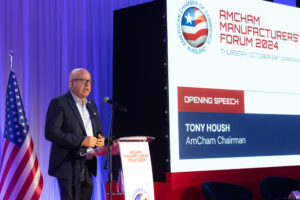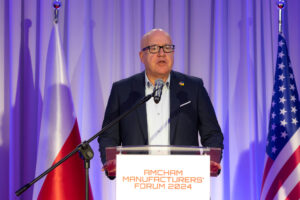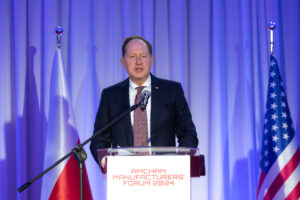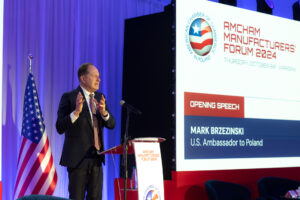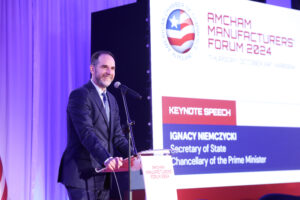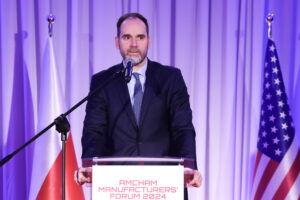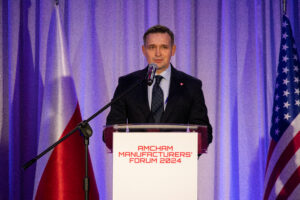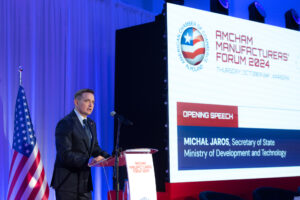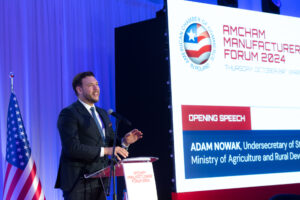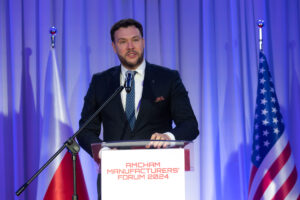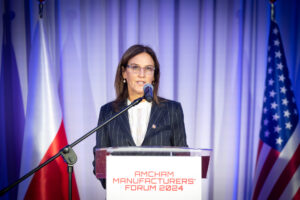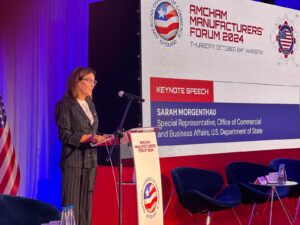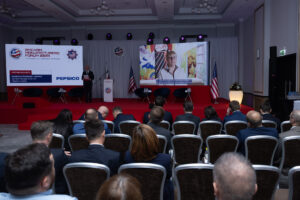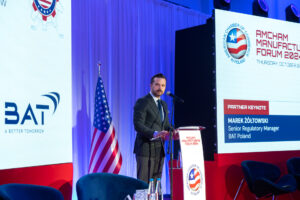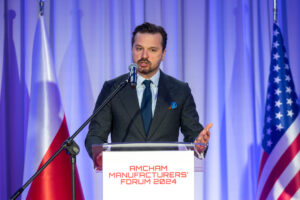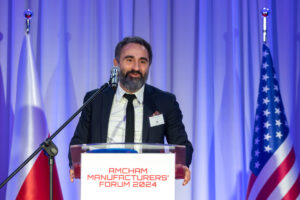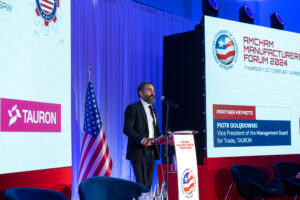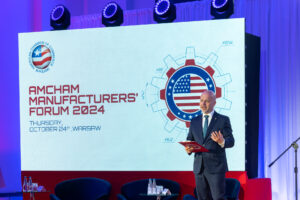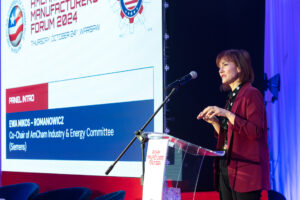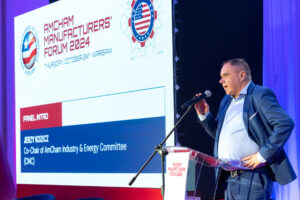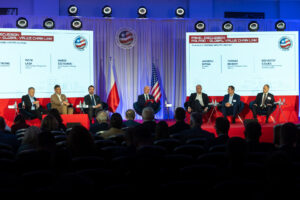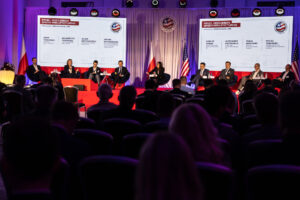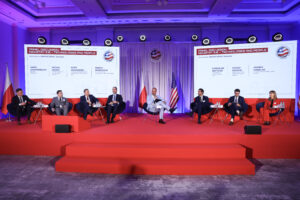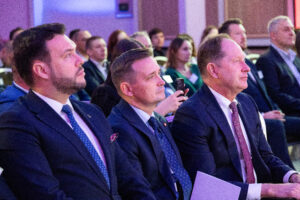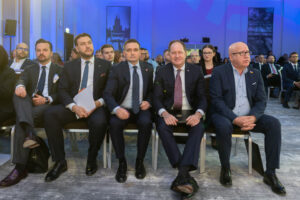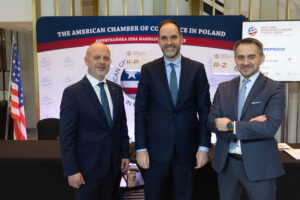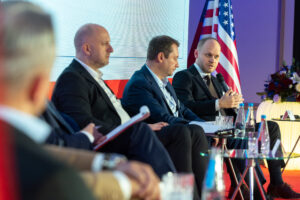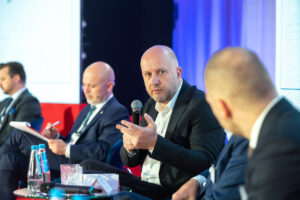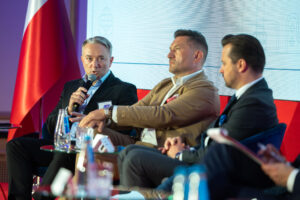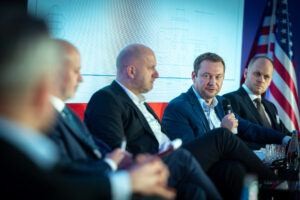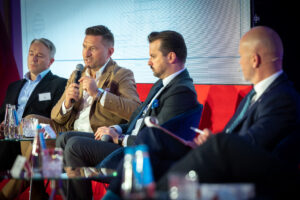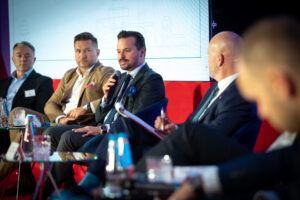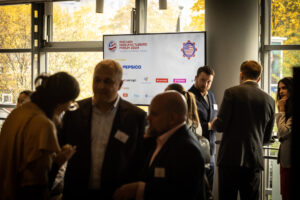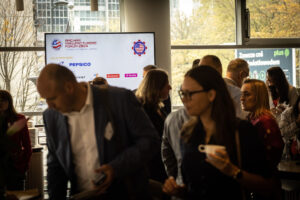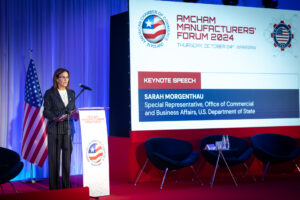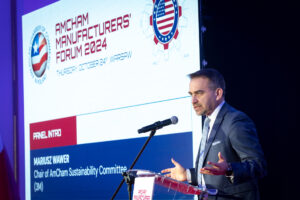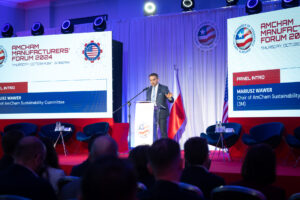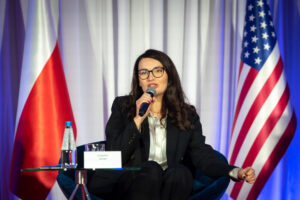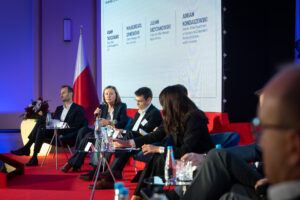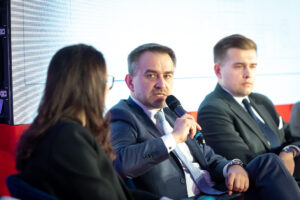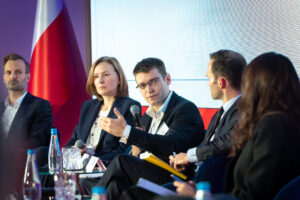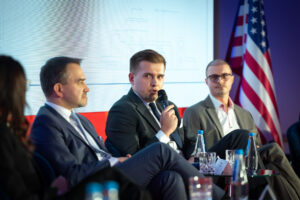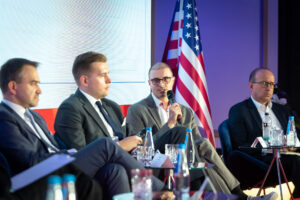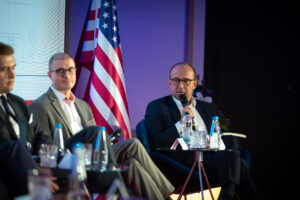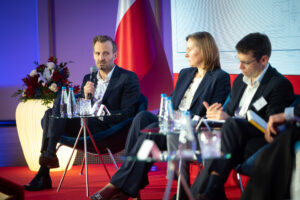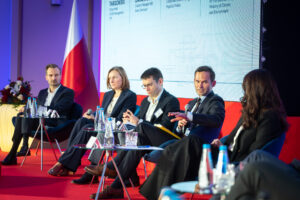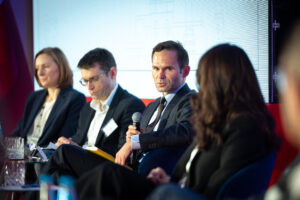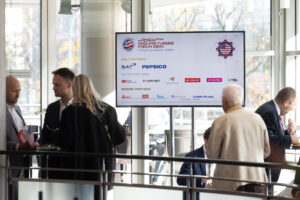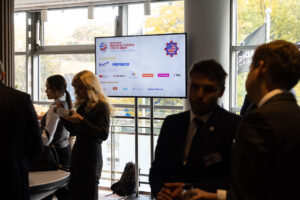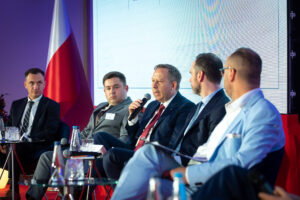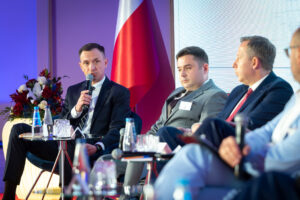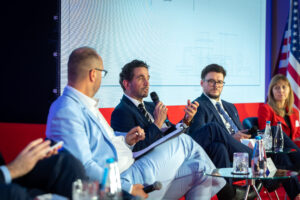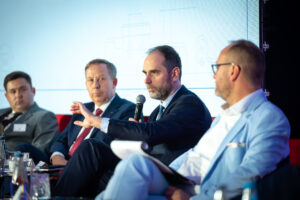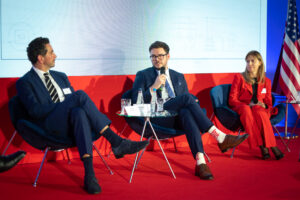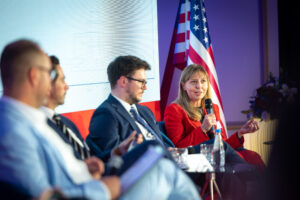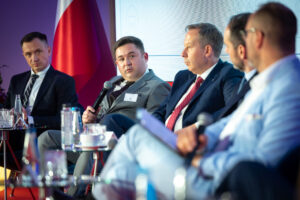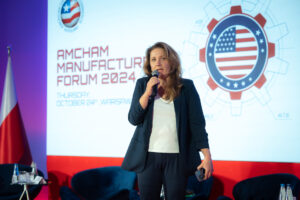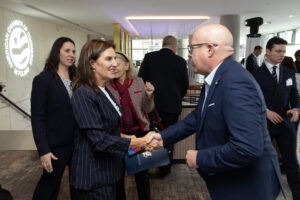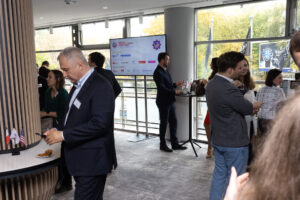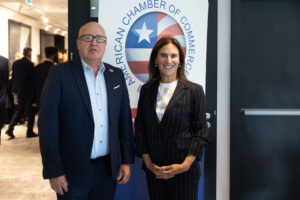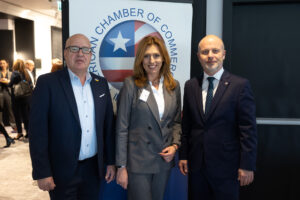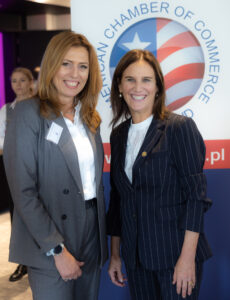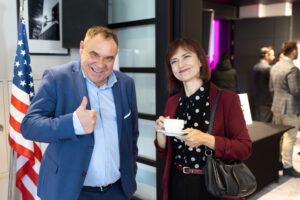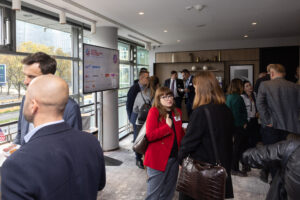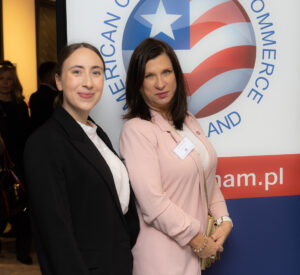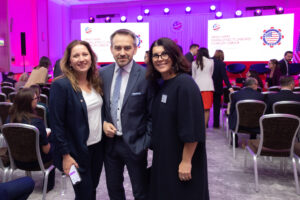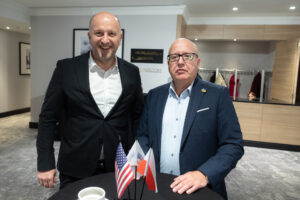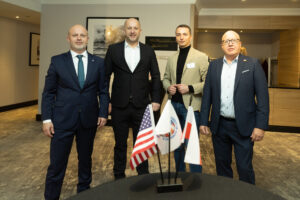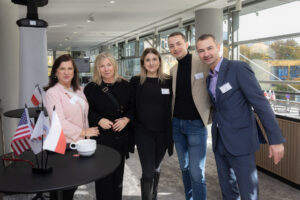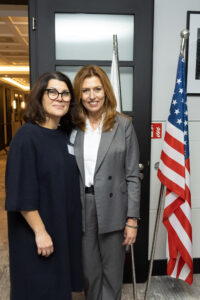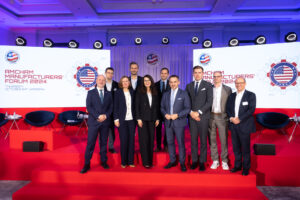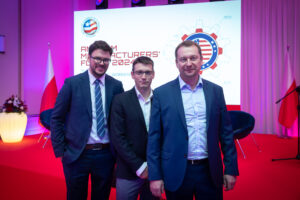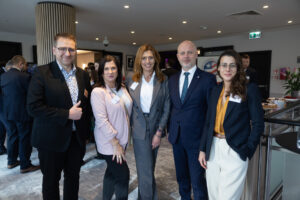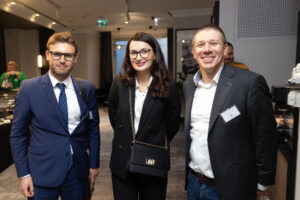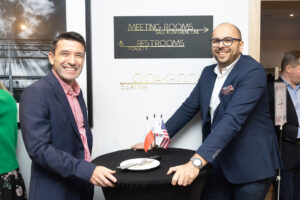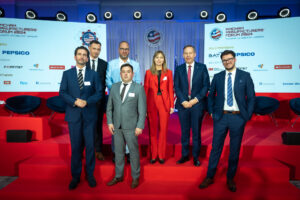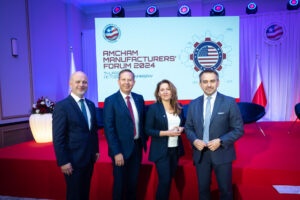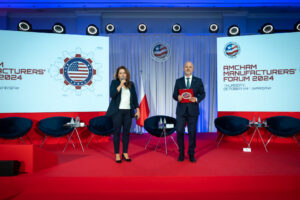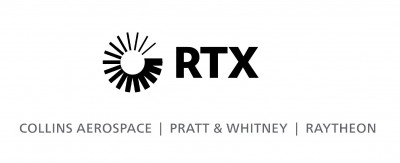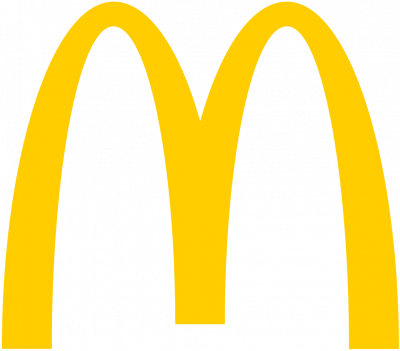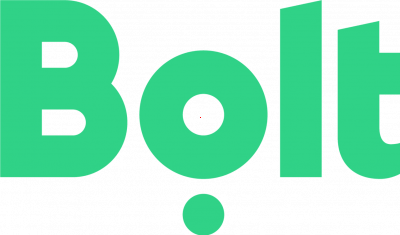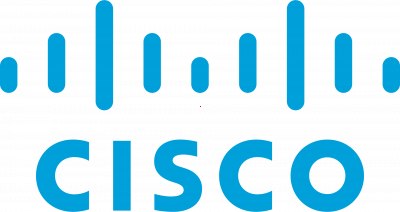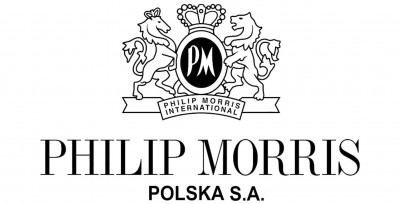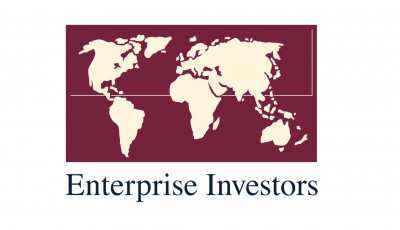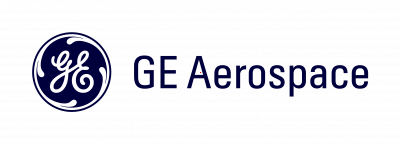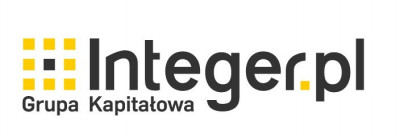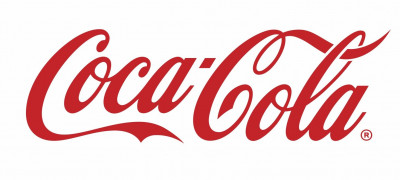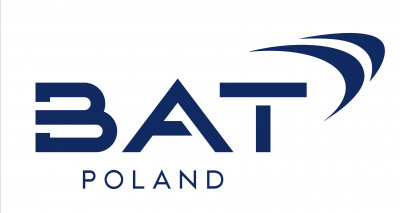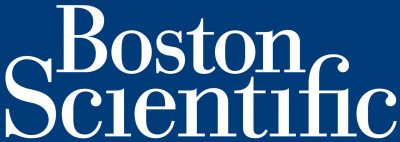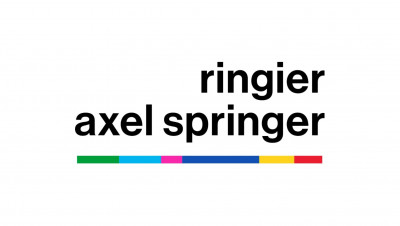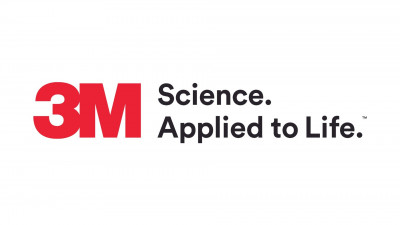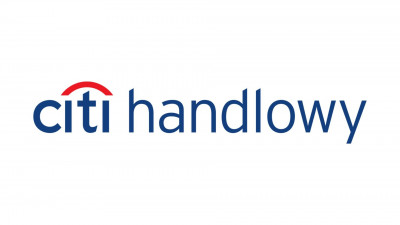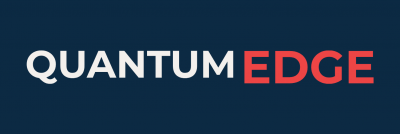AmCham Manufacturers’ Forum 2024
DATE
LOCATION
EVENT DETAILS
AmCham Manufacturers’ Forum 2024
AmCham Manufacturers’ Forum 2024 exceeded all expectations, and we couldn’t be more grateful!
A special thank you to our incredible speakers and panelists. Your thought-provoking insights brought value to the discussions. We had the pleasure to listen to Tony Housh, Amcham Chairman; Mark Brzezinski, U.S. Ambassador to Poland; Ignacy Niemczycki, Secretary of State at the Chancellery of the Prime Minister; Michał Jaros, Secretary of State at the Ministry of Economic Development and Technology; and Adam Nowak, Undersecretary of State at the Ministry of Agriculture and Rural Development. What is worth mentioning is that we had the honor to listen to the first public speeches from Minister Niemczycki and Minister Jaros after they assumed their new positions! Congratulations, Ministers! After that, we enjoyed remarks from our partners presented by Dagmara Piasecka-Ramos, General Manager at PepsiCo; Marek Żółtowski, Senior Regulatory Manager at BAT Poland, and Piotr Gołębiowski, Vice President of the Management Board at Tauron. We also had a chance to listen to a keynote speech by Sarah Morgenthau, Special Representative, Office of Commercial and Business Affairs at the U.S. Department of State.
Marta Pawlak, AmCham Legal & Public Policy Director, offered closing remarks and ensured that the knowledge that we gained during the Forum will be utilized for AmCham advocacy efforts. It will serve as the basis for a creation of a set of recommendations that we will be working on with the government to sustain and improve the competitiveness of the U.S. manufacturing business in Poland.
Thank you: PepsiCo, BAT Poland, 3M, Fortinet, ManpowerGroup, Santander, Grupa TAURON, TSL, Avery Dennison, CTP, Flex, Hillwood, and Sherwin-Williams - your support played a critical role in making this forum possible
Last but not least, we want to thank the whole AmCham team for contributing to the success of this event, especially Mateusz Jurczyk, AmCham Kraków & Katowice Branch Director, who coordinated the Manufacturing Forum and acted as our moderator of the whole event. Thank you, Mateusz!
During the Manufacturing Forum, we held 3 discussion panels to delve into crucial topics related to the manufacturing sector.
The event photo gallery is available HERE
1st discussion panel – “Poland—a Global Value Chain Link”
The first discussion held at the Manufacturers' Forum was entitled "Poland—a Global Value Chain Link". It focused on the efficiency and competitiveness of the country's manufacturing sector. The panelists were Andrzej Dycha, President of the Polish Investment and Trade Agency (PAIH); Marek Żółtowski, Senior Regulatory Manager at BAT Poland; Piotr Łada, Head of Project Management at Hillwood Polska; Tomasz Wronny, PepsiCo Senior Plant Manager; Krzysztof Czajka, Vice President for Sales at Tauron; and Paul Armstrong, Chief Operating Officer of TSL. Mateusz Jurczyk, AmCham Katowice and Kraków Director, moderated the discussion.
The discussion was preceded by introductory remarks from the representatives of Gold Partners of the event, PepsiCo Polska, and BAT Poland. In the pre-recorded video message, PepsiCo's CEO, Dagmara Piasecka-Ramos, said that the Polish economy has a huge potential to become one of the leaders in the global market. For this to materialize, proper legislation has to be in place, which does not curb business competitiveness in Poland but helps firms adapt to the changing market situation.
BAT's Marek Żółtowski, Senior Regulatory Manager at the company, said that the two major issues that the manufacturing sector is facing today are the relatively high energy costs and the transition to Industry 5.0. He added that a good collaboration between businesses and policymakers is a must for a successful transition.
The tone for the panel discussion was set by the Co-Chairs of the AmCham Industry and Energy Committee, Ewa Mikos from Siemens, and Jerzy Kozicz from CMC Poland. In their opening remarks, they said that the manufacturing sector is facing many new challenges posed by new technological developments and the transition to the "green economy", of which the rising prices of energy in Poland seem to be an imminent threat to the competitiveness of the Polish economy. They also called for a "robust dialogue" between representatives of the manufacturing sector and the regulators and lawmakers to help the sector retain its competitive edge in the global value chain.
Still attractive
All panelists agreed that Poland continues to be a good place for investment in manufacturing. Hillwood's Łada noted that the bulk of machinery production in Poland is generated by the white goods sector, concentrated around the cities of Łódź, Poznań and Wrocław. The annual output of the sector amounts to 40 percent of the entire production of white goods in the EU.
Apart from technology hubs concentrated in big cities, world-class high-tech is also developed in other regional hubs, such as Jasionka near Rzeszów. Polish local companies in areas that undergo structural economic realignments tend to collaborate with foreign investors which is mutually beneficial.
PepsiCo's Bronny noted that over the years the company has had good cooperation with local farmers in developing a special kind of potatoes optimized for specific production processes they undergo at the PepsiCo plant.
According to PAIH's Dycha, foreign direct investment continues to flow to Poland involving over 140 big investment projects in the PAIH pipeline at present. Their total value amounts to EUR 14 billion, which is by EUR 2 billion more than the value of the agency's client roster last year.
Dycha noted that today Poland is eyed by investors in back-end production and testing as well as semiconductors and microchips.
Stakeholder's dialogue
All speakers agreed that while the country is still attractive to foreign investors in the manufacturing sector, the conditions it offers are less favorable than those available to investors 10, 20, and 30 years ago. Among the problems signaled throughout the discussion was a need for an effective dialogue between business and lawmakers. Production companies face several legislative challenges from the EU regarding the union's policy governing the so-called "green transition" of its economy. Among the regulations are those governing the emissions of carbon dioxide, energy efficiency, water and air pollution and waste management, as well as new regulations governing new requirements for companies in the area of ESG reporting. The plethora of new EU regulations implemented on the national level by EU member states creates legal and regulatory complexities and challenges for business which may hurt the manufacturing sector's competitiveness in the years to come.
According to BAT's Żółtowski, while the market deregulation and the government's liberal approach to the market were beneficial for investors in the past, they can not be continued in the new economic and geopolitical reality. The government must play a bigger role in defending safe legislation for business. All speakers agreed that lawmakers should engage with the business sector in effective consultations so the national regulations and their implementations do not hinder the potential of manufacturing companies to deliver value in the European and global economies.
Room for improvement
The issue of the growing energy prices in Poland is commonly viewed as resulting in Poland's transition from energy sources the country used to import from Russia before the Russian invasion of Ukraine. However, the picture is more complex than that. The Polish power sector is also facing challenges resulting from the green transition of the EU economy. According to Tauron's Czajka, the power sector in Poland has been investing heavily in low-emission and renewable energy sources.
While the efficiency of renewable energy sources such as wind and solar depends on the weather conditions, power companies have to invest in energy storage facilities as well. In addition, they need to modernize the grid to make room for connecting new power farms.
Czajka noted that there is room for improvement when it comes to the regulations governing the construction of onshore wind farms and it can be achieved by a constructive dialogue between business and the government.
Czajka also said that while energy prices are high in Poland, they fluctuate daily allowing flexible companies to use power at that time. Czajka noted that businesses must learn to "live in symbiosis" with the power generation system adding, that the number of companies that purchase energy through the auctioning system is on the rise.
PepsiCo's Wronny noted that it still takes a long time to obtain building permits for renewable energy sources, while it may take even longer to have the newly built facilities connected to the power grid.
According to TSL's Armstrong, manufacturing companies try to improve their business conditions. Plant owners run tests on how energy is used across their factories to get better results. They also look at how to use the waste heat of the industrial process.
Good ambitions
PAIH's Dycha said that energy prices in Poland used to be among the lowest in the entire EU in the past. It is not excluded that 20 years from now, Poland may again offer some of the lowest energy prices in the union.
He added that the government is ready to work side by side business sector to continue to attract investors in the industry—including companies that are high-energy consumers—because industrial production delivers must-have components to a range of strategic sectors of the Polish economy such as automotive, construction and defense.
Dycha said that to keep Poland attractive for the manufacturing sector the government needs to have an intelligent assessment of the national and international markets. "Poland has to remain a leader in industrial production," Dycha said adding that "Countries with strong industrial sectors are more resilient during global economic crises".
2nd discussion panel - “Green Manufacturing”
"Green Manufacturing" was the title of the second panel discussion at the AmCham Manufacturing Forum. It focused on the issues manufacturing companies face when implementing EU regulations in such areas as decarbonization, the green transition of the EU economy, and the Corporate Sustainability Reporting Directive (CSRD). Angelika Szufel, Advocate and Counsel at CMS Poland, moderated the discussion. The panelists were Adrian Kondaszewski, International Cooperation Department Director at the Ministry of Environment and Environment; Małgorzata Zaniewska, Country Manager NEE, Avery Dennison; Julian Krzyżanowski, Corporate Affairs Manager at PepsiCo Polska; Adam Targowski, Group Head of ESG Management at CTP; Aleksander Przeździecki, Factory Legal and Public Affairs Manager, BAT Poland; Paweł Binkowski, Marketing and Innovation Director, Manpower Polska; Maciej Tarnawski, Managing Director, Head of Global Debt Financing in Poland at Santander; and Mariusz Wawer, Head of Government Relations and ESG at 3M CEE. Acting in the capacity of Chair of the AmCham Sustainability Committee, Mariusz Wawer delivered opening remarks, saying that according to the Global Risk report from the World Economic Forum, environmental issues have become a risk area for business, which, in the next 10 years, will top business risk charts taking over such well-know risks as cybersecurity, AI, and labor migration. The new risks are critical for manufacturing companies because their production processes impact the environment. "Decarbonization and the green transformation is a matter of surviving or not for the manufacturing sector," Wawer said.
He noted that "a tsunami" of EU regulations has put reporting obligations on companies regarding the energy types they use and the environmental impacts they make, including carbon footprints in their core activities and throughout their entire value chains. Atop of it came the issue of growing energy prices that skyrocketed following the Russian invasion of Ukraine. It creates a new business environment in which manufacturing companies must revise their business strategies, develop new ways of collaboration with their subcontractors, and engage in a dialogue with regulators and lawmakers regarding the EU regulations in Poland and how they will implement them.
ESG Conundrum
The implementation of CSRD in Poland was one of the issues that the panelists focused on in the discussion. Paweł Binkowski shared the conclusions of a Manpower survey conducted in October on 750 companies in Poland that revealed that only 17 percent of them have developed an ESG strategy, while 37 percent are still working on it, and 36 percent have only reached the initial planning phase. The report also revealed that the most significant ESG reporting areas were social (37 percent) and environmental impacts (26 percent). In turn, 70 percent of the companies said that their ESG strategies will improve the profitability of their companies, and will help them gain competitive advantage.
When it comes to the most pressing issues in implementing ESG strategies, 36 percent of the sample pointed to the difficulties in measuring ESG progress; 34 percent to the lack of knowledge and skills; 28 percent to the lack of access to the appropriate technology; 23 percent to the proper financing; and 20 percent to the access to human resource.
Talking about challenges in implementing ESG strategies, 22 percent of the sample pointed to the lack of knowledge; 20 percent to the lack of teams big enough to work with ESG; 19 percent to difficulties in obtaining proper data; and 19 percent to the costs of ESG reporting.
According to BAT's Aleksander Przeździecki, implementing CSR regulations is complex. There are not enough CSR experts, especially in small and medium-sized companies.
He said that often small subcontractors are discouraged from entering into contracts with big companies facing their ESG requirements in proposed contracts. To change that attitude, the government "should publish some general recommendations for implementing ESG requirements across companies," he said.
Manpower's Binkowski noted that there are not enough ESG experts in Poland, including professionals in direct and indirect environmental impacts, sustainable development strategies, and climate change.
He added that operators of renewable energy sources complain about the lack of trained personnel such as engineers, mechanics, service people, and auditors. "The solution is education," Binkowski said, adding that there is a role to play for the government in helping educational institution realign their curricula in accordance with future market demands.
Reskilling and upskilling the existing workforce is another way to address the problem. It is especially relevant in industries that "have no future", such as coal mining.
Binkowski also noted that a more liberal system for granting work permits to foreigners is necessary to attract experts from other countries.
Green Energy
Another major problem signaled by the panelists was the access to green energy. Aleksander Przeździecki said that the energy that BAT uses in its factory in Augustów is 100 percent green and produced locally. The company has built its green energy plant but to extend it, it had to ask the local government to get involved in the project to cut the red tape for issuing administrative permits. With the involvement of the Augustów Mayor, the company hopes to establish a green energy cluster that will supply not only the BAT factory but also other companies in the region. Time will only tell how long it will take, however.
Mariusz Wawer noted that 3M is working to build a photovoltaic farm to deliver green energy to one of its factories. He complained that there were impediments along the way. "A company may decide to build a green energy farm today, but it will have to wait for the next two years exchanging documents with the local zoning office," he said.
PepsiCo's Krzyżanowski voiced a similar problem. The company has built two photovoltaic farms for its factories totaling 5.5 megawatts/peak. The company plans to add a wind farm on one of its land plots, but the local authorities say they can not update the zoning plan for another two years. It means that the company has to wait for two years before it can submit proper documents to the zoning authority asking it to change the zoning plan. The red tape may take another two years.
On another land plot, PepsiCo plans to build a wind farm. It is a perfect "wind-rich" plot in the middle of an industrial zone. However, there are some residential buildings within 750 meter range which disqualifies the plot from being granted a wind farm license.
CTP's Targowski said that investors with factories in Poland that want to build their renewable energy sources have no other choice but to do it on land plots that they own in the vicinity of their factories. However, for new investors, real estate companies, such as CTP, offer industrial space with access to land plots cleared for hosting wind farms or photovoltaic farms.
This new trend in commercial real estate stems from examining the business perspective. "It is perhaps not the most efficient way for manufacturing companies to invest in building and maintaining renewable energy sources," Targowki said.
The panelists also talked about companies that buy green certificates for the energy they use. Because Poland has not signed the international insurance agreement for green certificates, companies in Poland can not buy them in other EU member states and are limited to the domestic market only.
New Packaging
Małgorzata Zaniewska noted that the regulations stemming from the European Green Deal have hugely impacted the packaging sector and also will have an impact on consumers. The introduction of new packaging and waste collection systems—such as the deposit system for drink packaging which comes into being in 2025—will bring the desired results only when consumers understand it.
However, there is not enough information available in the public sphere about the requirements of the new collection system for consumers. "There are voices that the system does not meet business expectations", Zaniewska said. "This requires a discussion because if the system is not properly implemented its cost will be huge for business," she said.
According to Julian Krzyżanowski, the deposit system is key to the closed-circuit economy, and a vital source of material for the producers of recycled bottles (rPET).
Another product necessary for rPET production is recyclate. 90 percent of PepsiCo bottles in the market in Poland are 100-percent-rPET. However, because of the shortages of high-quality recyclate in the domestic market, Pepsico has to buy it abroad, which boosts recycling costs for the company.
Utilizing Poland's Presidency
According to Adrian Kondaszewski from the Ministry of Climate and Environment, the exchange of ideas between business and government initiated by the AmCham Manufacturer's Forum this year came at the right moment. The ministry can use the accumulated information on the European level during the Polish presidency of the European Union which starts in January next year.
While Poland will continue the EU green transformation Policy, the country will also emphasize the need to balance it with the competitiveness of the EU economy. "The Polish presidency will not question the green transformation but intends to underline the need for the EU economy to be competitive," Kondaszewski said. "We have initiated such dialogue with the European Commission and other EU member states," he added.
When it comes to the regulatory environment in Poland, Kondaszewski said the ministry has had a good dialogue with the largest industries in the country. "We have had useful feedback from big companies," he said. However, he complained that medium-sized and small companies have not been actively engaging in a dialogue with the ministry. The areas of discussion formed by the AmCham Manufacturing Forum can result in delivering vital feedback for the ministry. "It is a good moment to share your views and opinions," Kondaszewski said.
3rd disucssion panel – “Industry 5.0 — Technologies and People”
The participants of the final panel discussion held at the AmCham Manufacturers' Forum, entitled "Industry 5.0 — Technologies and People", focused on the role of workers in the increasingly robotized, computerized and interconnected work environment. The panelists were Ignacy Niemczycki, Secretary of State at the Chancellery of the Prime Minister; Joanna Chmielak, Enterprise Sales Manager for Poland at Fortinet; Łukasz Gazecki, Senior Cyber Threat Intelligence Analyst at PepsiCo Poland; Michał Maśko, Strategic Initiatives Director EMEA at Sherwin-Williams; Stanisław Motylski, VP Operations and General Manager at Flex; Kamil Sadowniczyk, Manpower Polska Director; and Piotr Skaldawski, Country Governance Leader, HR Director at 3M Poland. Bartosz Ziółek, Head of Digital Solutions at Santander Bank Polska, moderated the discussion.
Humans at the Core
According to Piotr Skaldawski, Industry 5.0, or the next step in the ongoing evolution of the industry, is not about taking jobs away from workers but placing them in new positions where they supervise machinery and utilize new technologies that help them make decisions and, most importantly, unleash their creativity and determination to succeed for the company. "The collaboration or partnership between human workers and the machine is plain to see at our factory," Skaldawski said, adding that before the technological change, many people who are now in new positions used to provide physical labor at the assembly line.
He noted that Industry 5.0 at 3M is about utilizing the skills and talents of "exceptional people who pursue their dreams." For this purpose, they are equipped with various Industry 5.0 tools, such as AI.
Stanisław Motylski said that traditionally, people perceived work at the assembly line as dull and requiring physical strength. This perception needs to change. "Today, it is not about physical strength anymore," he said. He added that dull labor that requires strength is now performed by machinery. "With this, we can improve work efficiency at our factories," he said.
Michał Maśko noted that in the chemical industry, people are indispensable because their work experience and knowledge are unique. Yet, there is hope that AI, when implemented across the company, will enable them to innovate faster. "We have developed a type of paint that is safe for food containers. It took 10 years of work and EUR 8 million to develop. With AI we could have achieved that faster and for less. We hope AI will improve our work efficiency," he said.
AI will also help the company increase competitiveness in the regulatory area, allowing it to generate data points for sustainability reporting and other purposes faster and error-free. "AI will become an indispensable part of our professional life, but Industry 5.0 will not eliminate humans at the workplace," Maśko said. "Industry 5.0 is just another revolution in the ongoing technological progress. All the past four did not push humans away either," he said.
Changing Expectations
Because they deliver value for companies, humans will remain at the center of technological progress with Industry 5.0 and beyond, said Kamil Sadowniczyk. However, the speed of changes has made the business sector evolve the way they approach potential employees—they no longer expect that prospective hires can learn at schools and universities everything they need to know to work because "no educational system is capable of adjusting its curricula fast enough to keep up with the evolving needs of business," said Sadowniczyk.
It is just enough for companies that prospective workers have soft competencies, problem-solving skills, language skills, and general knowledge in science, technology, engineering, and mathematics. Everything else they need to know to start work they will get through training at the company. "Reskilling and upskilling is becoming increasingly important," said Sadowniczyk. He noted that in some EU countries, companies that send their workers for reskilling and upskilling get tax incentives, which helps them respond quickly to the changing business reality.
One way to help companies finance retraining programs may be through the Labor Fund—a government-run fund designed to battle unemployment. The amount companies paid to the fund through obligatory fees totaled PLN 9 billion in 2022, of which only 9 percent was used to finance training programs for the unemployed. According to Sadowniczyk, the unemployment rate is low, and the government does not have to spend big money to fight it. On the other hand, he noted that 1 in 10 companies complain about not being able to find competent experts for their business.
Keeping Industry 5.0 Safe
While industries depend heavily on computer systems, software and interconnectivity, they tend to increase their expenditures on cybersecurity. Joanna Chmielak said that in value, cybersecurity is the third-largest business globally, displaying the fastest growth rate year-on-year among other industries. "It is so because cybersecurity is no longer about protecting hardware and software but about protecting people, companies and critical infrastructure," she said.
PepsiCo has its cybersecurity teams in three hubs globally, including one in Poland. "Factories need to work nonstop. Meanwhile, altering critical parameters for the machinery may endanger the workers," said Łukasz Gazecki. "If someone breaks into the computer network and changes some critical parameters, factories may malfunction and output low-quality products, or even products that are dangerous to the consumer," he added.
The situation is even more critical than in the past. As AI can boost the effectiveness of legitimate businesses, the same technology can empower digital criminals. Add to it the geopolitics.
"We keep our digital infrastructure safe, but it is equally important that we educate the workers about cybersecurity," Gazecki said, adding that his company is not at the forefront of the cyber war, unlike infrastructural companies.
Chmielak noted that to prevent cyber threats, companies need a common platform to share information about potential cyber threats to enable cyber security teams to take adequate action. "We work with the European Commission and the governments of EU member states and offer our training courses on cybersecurity," she said.
Government Perspective
According to Ignacy Niemczycki, safeguarding the manufacturing sector's competitive edge in the EU is an important element of the union's economic development policy. However, it is not clear if the policy itself is good enough. "Some regulatory frameworks in the EU are designed as if the union was the most technologically advanced economy in the world and to such a degree that it can impose its standards globally," Niemczycki said, adding that the assumption is wrong.
The EU lags behind China and the US in technological advancement. According to estimates, the EU must spend EUR 800 billion annually on R&D to catch up with China and the US. Niemczycki said that while the ongoing technological revolution offers opportunities for the manufacturing sector to increase its competitiveness, it is hard for the government to decide which technology it should support through regulatory measures. "Today we are talking about technologies that nobody even knew would exist 10 years ago," Niemczycki said.
He added that China has a support system to help develop strategic economic sectors. In turn, the US has the Inflation Reduction Act (IRA), which offers state support to several industries. Such mechanisms are impossible to exist in the EU because they resort to taxation while in the EU taxation is in the domain of its member states. Some EU states believe that they should use public aid to help grow some sectors of their economies, but other states urge against it arguing that such aid delivered on the national level would shutter the common market of the EU. Poland is among the latter.
SPEAKERS
U.S. Ambassador to Poland Mark F. Brzezinski
Michał Jaros
Ignacy Niemczycki
Adam Nowak
Sarah Morgenthau
Ewa Mikos Romanowicz
Jerzy Kozicz
Adrian Kondaszewski
Dagmara Piasecka Ramos
Krzysztof Czajka
Piotr Łada
Tomasz Bronny
Piotr Gołębiowski
Andrzej Dycha
Małgorzata Zaniewska
Adam Targowski
Julian Krzyżanowski
Mariusz Wawer
Paweł Bińkowski
Maciej Tarnawski
Angelika Szufel
Stanisław Motylski
Łukasz Gazecki
Piotr Skaldawski
Bartosz Ziółek
Joanna Chmielak
Aleksander Przeździecki
Kamil Sadowniczyk
Mateusz Jurczyk
Michał Maśko
